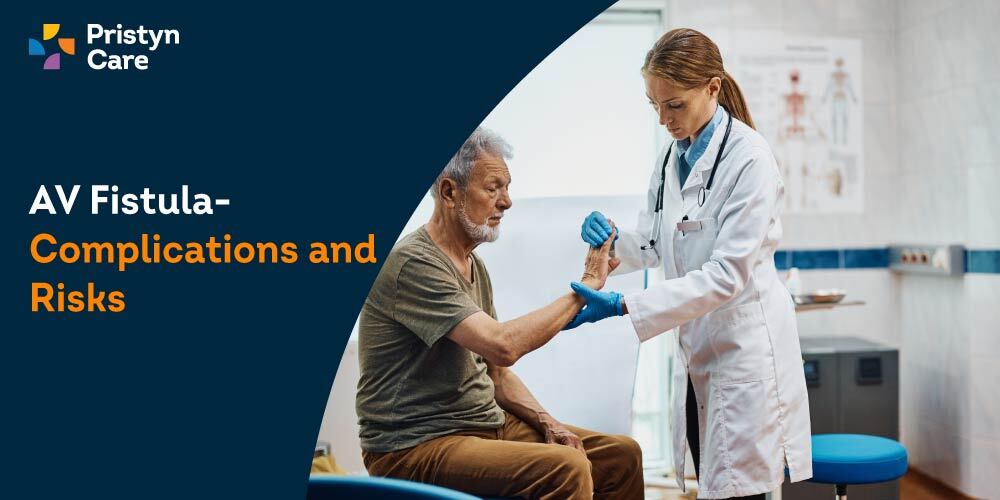
Arteriovenous Fistula, commonly known as AV Fistula is a treatment to boost the efficacy of vascular access hemodialysis. In comparison to other vascular access methods, Central venous catheter and Arteriovenous graft (AV Graft), AV Fistula complications are relatively low. This is precisely why this method is considered highly reliable, long-lasting, and safe. But, what is AV Fistula and how does it work?
Table of Contents
What is AV Fistula?
AV Fistula is a procedure in which vascular surgeons create a surgical connection between an artery and a vein to form vascular access for hemodialysis. This is done to ensure an unrestricted dialysis process. For those of you who don’t know, the Vascular Access paves the pathway for the patient’s blood to the dialyzer and back. The purpose? An effective filtration process! In AV Fistula, the blood flows from the artery to the vein, which increases the flow and pressure of the blood and causes the veins to enlarge. Now, how does this help with the dialysis process? This enlargement of the veins allows adequate blood flow required for dialysis and ensures a successful hemodialysis treatment. On top of that, patients are highly unlikely to develop any AV Fistula complications, and the treatment is quite long-lasting.
Risks & Complications Of AV Fistula
Even though AV Fistula is a safe procedure, it also accompanies its fair share of risks and complications. These complications can affect anyone, which is precisely why learning about all the potential risks and complications is essential. Listed below are some potential AV Fistula side effects and complications that all dialysis patients must be aware of.
Potential AV Fistula Side Effects & Complications During Treatment
1) Developing an allergic reaction to anesthesia. However, it is very rare.
2) Infected fistula and surrounding tissue, along with swelling in the arm.
3) Another AV Fistula complication is the formation of blood clots. These clots can travel to the lungs and pose life-threatening complications.
4) Heavy bleeding that can lead to shock.
5) In the case of a bruised nerve, patients can also experience numbness in the surgical site.
Potential AV Fistula Side Effects & Complications After Treatment
Anyone receiving the AV Fistula treatment must also be aware of the risks and complications that might flare up ‘after’ the treatment. Listed below are some post-treatment AV Fistula complications.
- Some patients might develop Steal Syndrome; a condition caused due to a significant increase in the blood flowing through the vein. This can affect hand movements, and may require another surgery.
- Infection, although rare, is another complication associated with AV Fistula. Therefore, all the patients are required to take care of the wound after the surgery is complete.
- Blood clotting can occur if the blood flow in the fistula stops. In this case, the surgeon will create a different type of access.
- Aneurysm or enlargement of blood vessels can occur due to repetitive puncture. Surgical intervention may be needed.
These complications can affect anyone. However, they can be reversed with immediate medical attention. Therefore, make sure you get in touch with a healthcare provider as soon as you experience these symptoms.
How To Minimize The Risk Of Developing Side Effects of AV Fistula
AV Fistula can take upto 14 days to heal. Till then, all the patients are advised to take the necessary precautions and avert the chances of developing potential complications. The following tips can help keep AV Fistula risks and complications at bay:
- Make lifestyle modifications as suggested by the doctor and follow all the instructions and recommendations.
- Keep a check on your pulse rate. Get in touch with the doctor if you notice significant fluctuations.
- Avoid wearing tight accessories on your arm. Doing so might disrupt the blood flow.
- Do not lift heavy objects with the arm with AV Fistula, and avoid getting the arm injured.
- Avoid keeping the arm with Fistula bent for too long. Also, make sure you don’t sleep on your arm.
- Take the prescribed medicines (if any) as directed.
- Avoid taking blood pressure, or drawing blood from the same arm.
If you experience complications despite taking all the necessary precautions, make sure you get in touch with your doctor for timely diagnosis and treatment.
How Many Types Of AV Fistula Surgeries Are There?
AV Fistula surgeries are of 3 types:
- Radial Cephalic Fistula- In Radial Cephalic Fistula, the radial artery is connected to the cephalic vein. This type of fistula aims to preserve upper arm vessels. However, the blood flow in this fistula is lesser than in the other available options.
- Brachial Cephalic Fistula- In Brachial Cephalic Fistula, the cephalic vein is connected to the brachial artery. It is created using the upper arm, chiefly because the blood vessels in this area are larger. Additionally, this fistula allows good blood flow.
- Brachial Basilic Fistula- This Fistula is quite complex to create and it is used in patients who have had several failed AV fistula procedures. In this method, the surgeons create a connection between a mobilized vein and a superficial tunnel.
AV Fistula Treatment At Pristyn Care
At Pristyn Care, we offer top-of-the-line AV Fistula treatment. Our vascular surgeons encompass years of experience and use advanced technology and the best treatment methods to ensure the best results for patients. Here are some reasons why you should choose Pristyn Care for your treatment:
- No Cost EMI – We offer various No Cost EMI options to help you manage your AV Fistula surgery expenses..
- Free Doctor’s Consultation – The care coordinators at Pristyn Care will schedule a free consultation with an experienced Vascular Surgeon, who will offer the best treatment for you.
- Free Transportation- We arrange free pick-up and drop-off services for all patientsto help them commute with ease.
- Free Follow-up Consultation- All the patients get a free follow-up consultation with the doctor to track their recovery progress.















